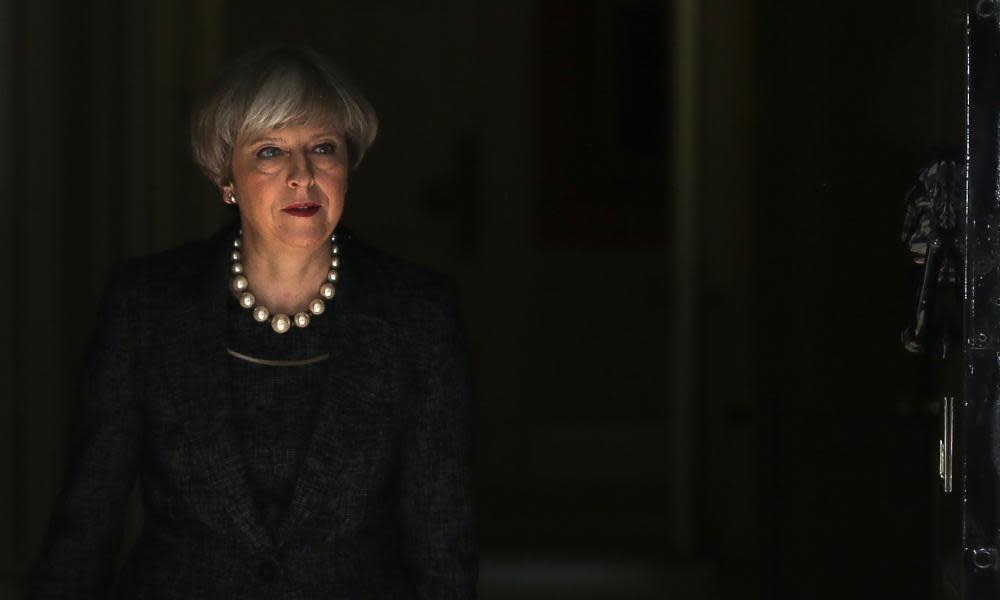Theresa May plans anti-extremism drive if Tories win election

Theresa May is expected to launch a major offensive to “drive extremism out” of the public sector and civil society in the wake of the Manchester terrorist attack if the Conservatives win the general election on 8 June.
A new commission charged with identifying and exposing examples of extremism is to be set up, and support will be given to the public sector and civil society in identifying extremists and countering their messages.
The campaign detailed in the Tory manifesto will be accompanied by the consideration of new criminal offences to outlaw non-violent extremism in Britain for the first time.
The campaign is expected to revive a shopping list of measures first set out by May when she was home secretary just before the 2015 general election. She called then for the development of a “counter-entryism strategy” across government and the public sector, citing the Trojan horse affair in Birmingham in which she alleged “extremists used entryist tactics to infiltrate legitimate organisations to promote their own agendas”.
In 2015 she also detailed a wide-ranging strategy to tackle non-violent as well as violent extremism in Britain, which included banning orders for extremist groups that fall short of current terrorism proscription thresholds, extremism disruption orders against individuals who incite hatred and closure orders against premises used to host extremist meetings or speakers.
In her speech two years ago May compared the battle against extremism to the concerted action taken last century to tackle racism. She said the kind of approach taken against racism, which involved banning discriminatory behaviour and punishing racially aggravated crime, was needed for counter-extremism.
Since then, however, May’s “full spectrum” response has largely remained stalled. Over the past two years, it has been met with reservations from cabinet colleagues in the Cameron government and serious problems finding a robust definition of extremism that would survive legal challenge from a banned group or individual.
It also contrasts sharply with the statement by the home secretary, Amber Rudd, on Wednesday that she had not heard any demand for new tools or extra measures from the police in the past three months to tackle the problem.
Rudd confirmed that a refresh of the Prevent programme first disclosed last November would come into effect in June. The deradicalisation programme is to be expanded rather than scaled back after an internal Whitehall review concluded that it needed to be strengthened. It is also expected to contain action intended to acknowledge and address its reputation as a “toxic brand” among some Muslim communities.
New powers are already in the pipeline as part of the “snooper’s charter” legislaton to compel tech companies to hand over encrypted data on targeted named individuals backed by an official warrant. Pressure may also be stepped up to see much greater use of powers to seize the passports of British citizens returning from fighting in Syria, which are believed to have been rarely used.
The Tory manifesto repeats May’s comparison with the 20th-century struggle against racism in Britain, saying: “To defeat extremism, we need to learn from how civil society and the state took on racism in the 20th century. We will consider what new criminal offences might need to be created, and what new aggravated offences might need to be established to defeat the extremists.”
A Conservative source told the Daily Mail on Thursday: “Just like racism, extremism can be defeated. But it will take sustained effort to change cultural and social norms amongst certain sections of the population.
“We know that extremism is not confined to any one community and we want to use a commission, like the Commission for Racial Equality, to drive extremism out of our society,” the source was quoted saying.
The Labour party in its manifesto criticises the lack of effective new measures over the past two years to take action “against a growing problem of extreme or violent radicalisation”, pledges to ensure the security services and police have the resources they need and commits to a review of the Prevent programme.

 Yahoo News
Yahoo News 
